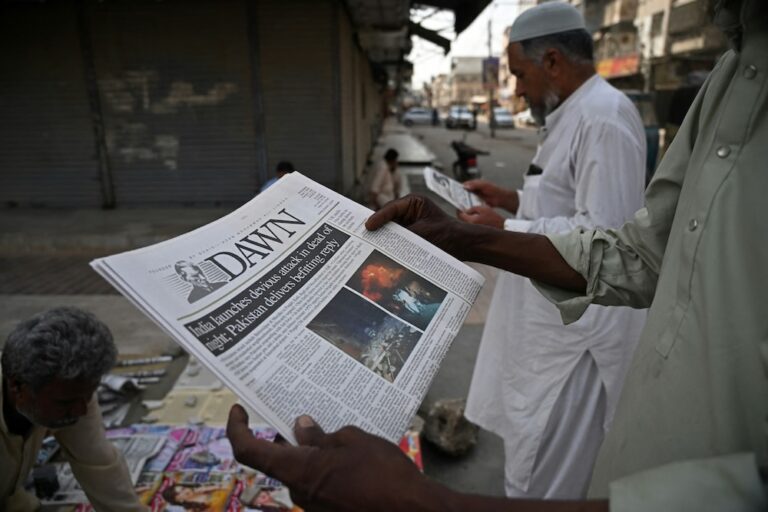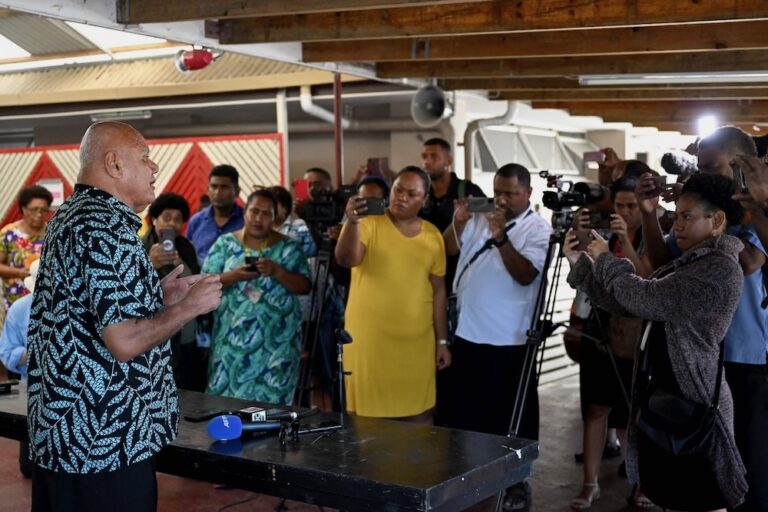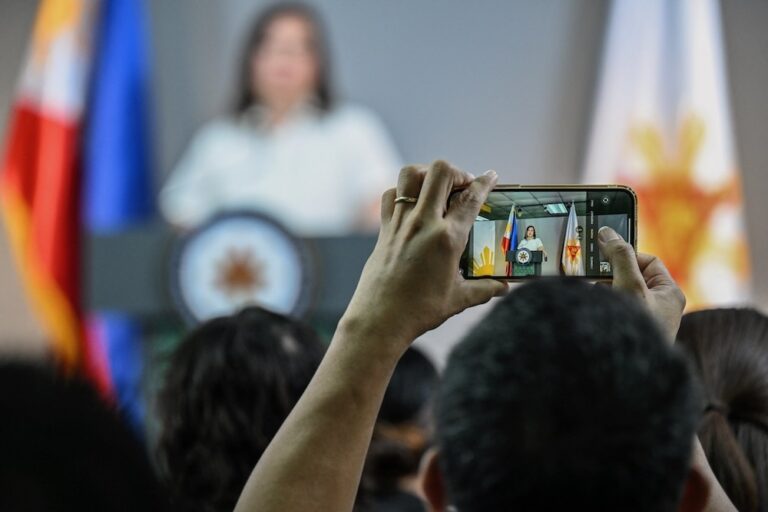March 2024 in Asia-Pacific: A free expression round-up produced by IFEX's regional editor Mong Palatino, based on IFEX member reports and news from the region.
India’s coming election is undermined by online censorship and attacks against critics, Hong Kong’s Beijing-style security law takes effect, Vietnam arrests three prominent bloggers, and families demand justice as they speak out against impunity in the Philippines, Sri Lanka, and Thailand.
India: Harassment of critics and online censorship ahead of elections
The continuing restriction of information and intimidation of critics threatens to undermine elections in India where more than 960 million people are eligible to vote and choose the country’s next leaders.
As of 23 March, 177 social media accounts and websites linked to farmers’ protests have been blocked by the government. The list includes independent media outlets known for their critical reporting. Kian Vesteinsson, senior research analyst of IFEX member Freedom House, highlighted how restricting public access to information can gravely affect the election process.
“Diverse and independent discussion of politics, the economy, and broader societal challenges plays a critical role in shaping voters’ choices ahead of elections. Degrading access to such information fundamentally limits free decision-making and infringes on the exercise of citizens’ most important political right.”
Meanwhile, IFEX member SFLC.in and other stakeholders urged authorities to adopt measures against misinformation and to engage tech companies in ensuring the prevention of the spread of manipulated media content “tailored to electoral risks.”
Aside from the blocking of websites, human rights groups have flagged the legal prosecution of civil society groups and the denial of visas to individuals whose works are deemed a “nuisance” by the ruling party. For example, British academic Nitasha Kaul was barred from entering India in February while French journalist Vanessa Dougnac was forced to leave the country after her work permit was not renewed.
Vietnam arrests three activist bloggers for “anti-state propaganda”
The police in Vietnam arrested bloggers Nguyen Chi Tuyen and Nguyen Vu Binh on 29 February, and Hoang Viet Khanh on 1 March, for allegedly “conducting propaganda against the state.” Phil Robertson, deputy Asia director at Human Rights Watch, asserted that “these three activists are not guilty of anything except exercising their basic rights to freedom of speech.”
Nguyen Chi Tuyen participated in anti-China protests in the early 2010s, and pro-environmental protests in the mid-2010s. Since 2018, Hoang Viet Khanh has maximised his Facebook page to comment on social and political issues. He once wrote that the state crackdown of writers was meant to instill fear so that citizens would be “afraid to expose the truth unfavorable to the one-party regime.”
Nguyen Vu Binh, an honorary member of several PEN centers, has published more than 300 entries on the US-funded Radio Free Asia (RFA) Vietnamese blog since 2015. His last entry in February tackled the solidarity among human rights advocates and families of political prisoners. In a statement, RFA President and CEO Bay Fang and PEN International President Burhan Sonmez described the arrest of Nguyen Vu Binh as “another example of Vietnam’s unjust targeting and brazen intimidation of independent journalists.”
Hong Kong approves Article 23 national security law
Hong Kong has approved the Safeguarding National Security Bill, commonly referred to as Article 23 of the territory’s mini-constitution. It reflects the National Security Legislation imposed by Beijing in 2020 while introducing new crime categories, namely “espionage”, “external interference”, and “theft of state secrets”. The penalty for the charge of “sedition” was increased from two years in prison to ten years.
At least 145 global groups have signed a statement denouncing the legislation.
“Article 23’s vague and broad definitions of crimes adversely impact not only individuals facing political arrests and prosecutions, but also everyone else in Hong Kong. The law opens the door to further arbitrary arrests and detentions while escalating censorship, creating a global chilling effect.”
IFEX member Hong Kong Journalists Association, in its submission to the government, reiterated its stance that “the press is not a threat to national security” as it warned that the new law could criminalise the work of media.
Michael Caster, ARTICLE 19’s Asia Digital Program Manager, outlined the ways in which tech companies can avoid being complicit in Hong Kong’s shift towards “Beijing-style authoritarian internet governance.”
X (Twitter) remains blocked in Pakistan
Since 17 February, the social media platform X (Twitter) has been blocked in Pakistan for reasons not stated by authorities. The site became inaccessible a week after the elections, which raised more suspicions about the credibility of the voting results.
Authorities initially denied that they are responsible for the inaccessibility of X, but subsequent court sessions have revealed that they indeed ordered the blocking of the platform. More than 70 civil society groups have signed a statement describing the blocking of X as a “sobering illustration of growing digital censorship in the country.” The statement castigated authorities for their contradictory statements regarding the decision to block X.
“The absence of transparency in the decision-making processes surrounding network shutdowns and platform blocking and complete disregard for any accountability has resulted in an obvious erosion of trust between the state and its citizens.”
Writing for the Digital Rights Monitor, an initiative of IFEX member Media Matters for Democracy, Usman Shahid underscored the role of X in the country’s media landscape. “The platform has become a staple space for social and political discourse, allowing regular users to engage in dialogues worthy of attention and enabling them to interact with key public figures.”
Families speak out against impunity
In the Philippines, the family of radio journalist Gerardo “Gerry” Ortega, who was killed in 2011, continues to fight for justice. The alleged mastermind of the crime is a former governor who remains in hiding. In an interview with the Committee to Protect Journalists (CPJ), Michaella Ortega voiced their family’s anger and frustration.
“Dad was a loud voice. A voice that held corrupt practices to account, a voice that was speaking truth to power – and then that voice was snuffed out. There was no way that the system could protect these voices.”
Despite the slow pace of the struggle for justice, Michaella said her family will not back down. “We fight because we hope to be able to contribute to our community. We have fought precisely because of that kind of support from civil society that we’re not left behind to fend for ourselves. That’s the reason why we can continue to show up. We wouldn’t be able to fight if other people stopped showing up first.”
In Sri Lanka, Sandya Ekneligoda said her family will not give up the search for her husband, a journalist who went missing 14 years ago. “I don’t know how long it will take, but I will get justice for my Prageeth.” Prior to his abduction, Prageeth Ekneligoda was a known government critic, cartoonist and columnist for the news website Lanka e News.
In a video interview with CPJ, Sandya shared her ordeal. “I believe no woman should go through what I have gone through. The first thing was hate speech, including from politicians and ministers.”
She continues to uphold Prageeth’s legacy. “I want the world to remember Prageeth as someone who wrote about the important issues and understood the responsibility of being a journalist. When others are talking about my Prageeth, it means he is still living in people’s hearts.”
In Thailand, the search continues for human rights lawyer Somchai Neelapaijit who was forcibly disappeared 20 years ago. Somchai was a lawyer known for defending Muslim minorities in the southern part of the country. The campaign for justice is led by Somchai’s wife, Angkhana Neelapaijit, who recently urged young Thais to remain vigilant.
“I may die without knowing the truth, but I hope that the next generation will continue to question the state, that they will continue to remember those who were disappeared, that they will continue to make demands about these things,” she said in an interview with independent news website Prachatai.
Myanmar women after the coup
According to Progressive Voice, Myanmar junta forces have killed at least 810 women and arrested at least 5,416 women, with nearly 4,000 still detained, over the past three years. The group said that in order to end the suffering of women in the country “the international community must take swift, decisive action to put an end to the military junta, hold it accountable for its crimes, and pursue justice for all of Myanmar’s people.”
IFEX member Mizzima News also reported that women have assumed leadership roles in the ‘Spring Revolution’ as resistance against the junta continues to gather momentum across the country.



